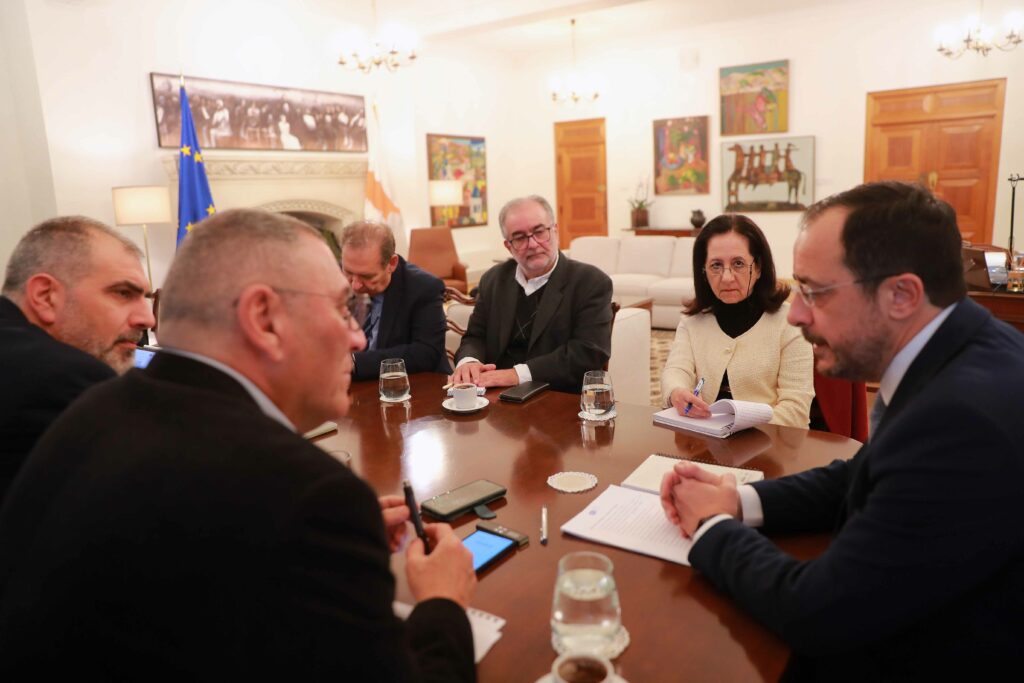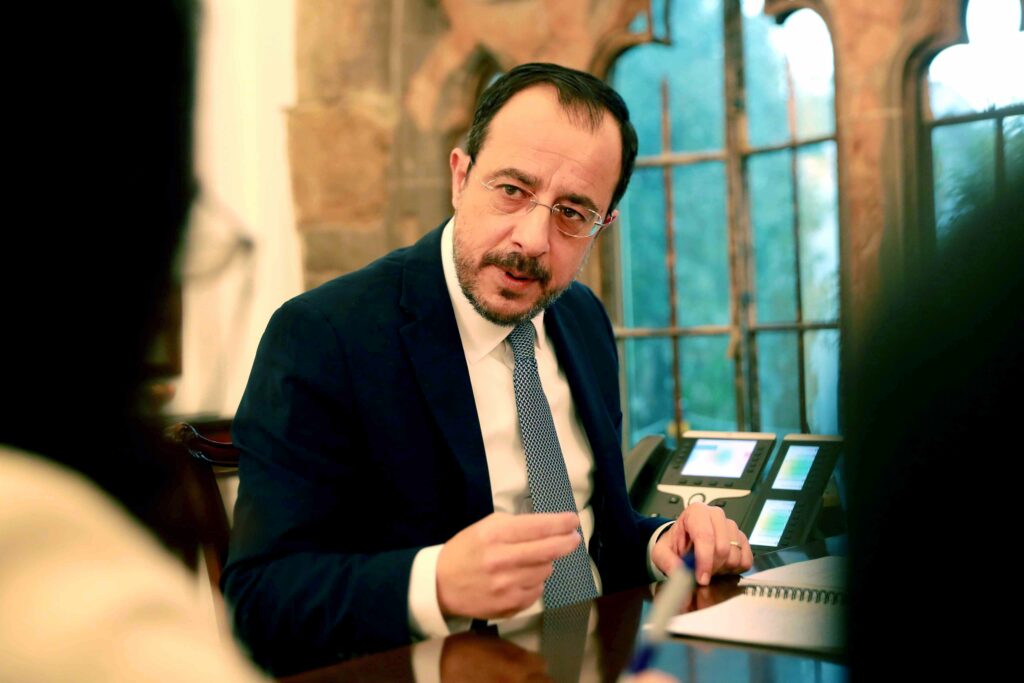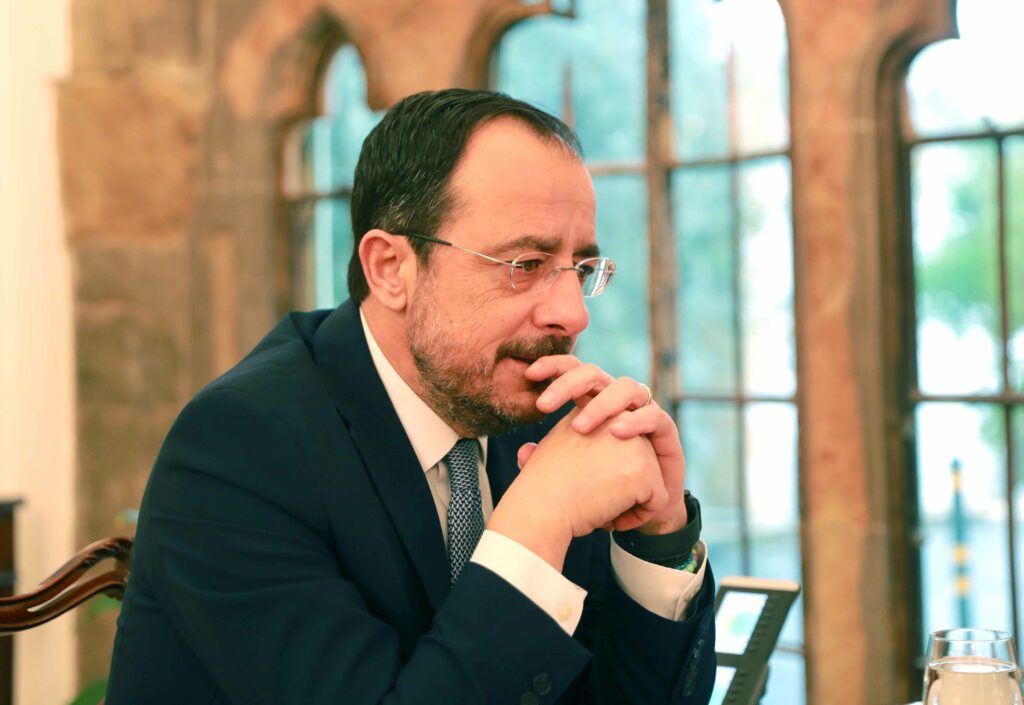Filenews 29 December 2024 - by Andreas Pibishis,Androulla Taramounta,Kostas Venizelos,Frixos Dalitis
President Christodoulides unfolds his plans for 2025 and the goals of the government program in order for the changes to reach citizens and address the problems of their daily lives, starting with inflation.
In his interview with "F", the President of Democracy stands by the criticism he receives and submits his own counter-argument, noting that reforms will continue as well as the promotion of measures to improve citizens' daily lives. The President wants to strengthen the middle class – which according to presidential estimates is recovering – and to strengthen Cypriot businesses.

What are your goals for 2025 as it is expected to be a difficult year since all parties enter an early election campaign for 2026?
Our goals for 2025 are to ensure the continuation of the country's growth path and the steady growth of our economy in order to create conditions of full employment and prosperity. To expand the international footprint of the Republic of Cyprus, to strengthen internal and external security and to promote reforms and changes to upgrade citizens' living standards and improve their daily lives. Of course, the top priority remains the effort to resume negotiations for a solution to the Cyprus problem.
The parties' campaign began the day after the 2023 presidential election. Especially from the parties that did not support me. I want to say about DISY that it is clear that its leadership put the party in opposition. It is fully respected and there is no question of the statements made. Indeed, on some issues, criticism from DISY is much more strongly oppositional than AKEL's. So there is no question about the leadership of DISY. Our own assessments are that a significant portion of DISY, as well as the other parties, supports the government and its work and this for me is particularly positive. But on what DISY is, it is clear that it is the opposition. There is no vacillation or anything else.
– Why do you feel the need to emphasize this?
– Because I hear and read about conversations that are taking place. In politics we have to have clear positions, and I think that is the net position.
There was a rumour after your meeting with the president of DISY last October that you opened some channels of communication. Is that not the case?
There are channels of communication, but this has nothing to do with whether DISY is a coalition or an opposition. This issue is closed. The statements made and the positions on many issues are repeated, and it is clear where DISY stands, according to the party leadership.
– Yes, but you need DISY in Parliament...
– I need all parties in Parliament. And the vote of the last Member in the Legislature is important, as we saw recently on the issue of bank taxation.
– Do you consider that the invitation you extended last year through your interview with "F" to DISY to participate in the government is now outdated?
– I did extend an invitation. The answer was clear. The matter is closed, and it is not something that concerns us.
– Nevertheless, you make overtures to DISY and choose people from DISY, not necessarily frontline executives, for appointments in semi-state or other organizations...
– I choose people from all sectors who support the policy we follow, including people from DISY. As far as the substance of politics is concerned, I believe that if DISY had been in power, it would not have conducted itself differently from the current government, neither on economic issues, nor on foreign policy issues, nor on the Cyprus problem. But there is, for reasons that are fully respected, a clear position from the party leadership that DISY is in opposition, so the matter is closed.
– From the dialogue you have with executives and the president of the party, do you get concern about a split in DISY, which is why they maintain this stance?
– I do not know the reasons and nor have they mentioned anything to me and I am certainly not here with any approach or statement aimed at splitting DISY. This is not my goal and neither do I want to create a problem for DISY or any other party.
I said before the election that I would not proceed with the creation of a party and I will abide by that

– It is heard in the surrounding area that a party will be created which will be...
– There is no question of that. I said before the election that I would not proceed with the creation of a party and I will abide by that.
– If it is from people who have supported you before and after the elections?
– I have been asked by some people who would be interested in this and my answer was dissuasive. What they will do I cannot know. But I do not think it wise, and I say this publicly, to have a party from the bowels of DISY.
– So do you prevent them when they approach you or use your name to form pillars for the formation of a party?
–Yes.
– With these facts do you think you can govern? Taking into account the correlation of forces in Parliament, where, in addition to the two opposition parties, DISY and AKEL, many MPs of the co-governing parties criticize the government?
– The government is criticised by MPs from all parties. At the same time, there is support for the government's actions from MPs from all parties, including DISY. There are some who have been critical since day one and I don't expect them to change their policy or approach because they never accepted the verdict of the Cypriot people in the 2023 presidential elections. In fact, I believe that in some cases their attitude costs the Cypriot people. I would like to give an example. Six months ago we submitted to Parliament a proposal for a law to have a ceiling on some basic necessities products. For example, water should be sold for 50 cents. It has been discussed for so long and now I hear that it may be voted on in January. It has been before the House Trade Committee for six months. Beyond that, it is indicative that both within the parties that support us and within the opposition parties, there are different positions on key issues. As it is, for example, on the issue of the electricity interconnection between Cyprus and Greece. So I think, there is no uniform treatment of the government within the parties.
– This concerns all parties...
Yes, it concerns all parties. But what interests me at the end of the day is that there should be a majority on major issues, such as the vote on the budget. It was important for the government to pass the 2025 budget and I express my appreciation to the parties that voted for it.
– Do you think that there is expediency among MPs from all parties who operate in this way?
– No, no expediency. Their basic approach was what it was at the time of the presidential election. I was supported by parties where we know that some people made different choices and continue in the same pattern. The same is happening in DISY. Some party officials even chose the second round to support AKEL's candidate. They continue to have the same approach and it is fully respected.
– You said earlier that some do not accept the verdict of the people. Are you referring to Mr Averoff Neophytou?
– Not only to Mr. Neophytou. There are others, including, of course, Mr Averoff Neophytou. But Mr Neophytou is one of 56 members of parliament.
– But you highlight him as a Government, with the way you treat him, as your main opponent.
–Disagree. I said and I repeat that Mr Neophytou is one of the 56 MPs in the House of Representatives. When he criticises the Government, we must respond in the same way as any Member who criticises. It is in this context that we replied to Mr. Neophytou.
– You mentioned as an example the ceiling on water...
– The water cap is a very simple issue that has been discussed for six months...
– Does it show anything? Whatever and where the parties do not serve their own interests, they block the government's effort... what;
– Yes, it is something that is done on some of the issues. And this is also perceived by society.
Measures to strengthen the middle class
You said about measures for the middle class. When will they be announced and where will they be targeted?
I will start by saying that when we took over as government there was precision which was mainly due to external factors related to what was happening in Ukraine. We are moving in two directions and I am pleased that we are seeing results. One direction concerns benefit policy, because we must help those of our fellow citizens who are in dire need, and that is why we have announced packages in excess of €700 million.
The other direction is to find lasting medium-term solutions, because it is only through permanent solutions that we can tackle the cost. I am pleased that we have announced seven housing plans and there is a huge response, especially from our young people.
We recently had a meeting with the banks. I must say that my own suggestions concerned housing and our older fellow citizens who have difficulty with electronic transactions and I am glad that they responded with specific plans and measures. In addition to housing, we have announced several energy plans such as the "photovoltaics for all" plan, which are exhausted and we will announce new ones in 2025. There is a great response from people because the measures we are announcing focus on the middle class.
In early 2025 we will present our proposals for the country's tax transformation, which moves in two directions: Towards strengthening the middle class and strengthening Cypriot businesses, so that there is no unfair competition for Cypriot businesses.
With regard to our proposals for the middle class, we want to link tax income to the family, because we have a huge problem called low birth rates which takes ten years to tackle. We have already announced two demographic packages. This is the first time that so many measures have been announced to tackle the low birth rate. This will be followed by tax reform that will cover all these problems that we have, including inflation.
– How is this to be done?
– Through incentives that will be given to special categories, we will essentially increase tax-free income. I said so before the elections. Through a formula that we are working on – and I am in constant contact with the team working on tax transformation – we will increase the tax-free income of each family. For one or two or three children, etc. If one takes advantage of energy plans to have more benefits, for the green transition, for technology... The same for companies. Anyone who takes advantage of announced plans will gain additional benefits through tax reform.
– It will not have horizontal measures...
– The aim is to focus according to the situation of each household and what it uses from the Government's plans. It's also important to say that if you look at the statistics, the middle class grew in percentages. Instead of declining as was the trend previously, now the middle class is growing. But the most important thing is that we are raising wages. The minimum wage was raised, the ATA was given, and this also guides increases in the private sector. The economy is doing well, we have reached a point where unemployment has fallen to 5%... There is full employment and job vacancies are increasing, which pushes up wages as well. But we also have a plan, which I have said many times before the elections, and it concerns the broadening of the tax base of the economy. Services are very important, but there are new areas where investment is being made and this is reflected in the rate of growth.
In 2023 we had foreign direct investment of €3.5 billion. which created 500 high-paying jobs. We had the largest increase in foreign direct investment in the EU of 129%. In 2024 this trend continues. By September, 750 new jobs had been created. We have reached the point where we are in search of a workforce to fill vacancies. And for this reason, following the example of Greece, we are working on a plan to go abroad, with me in charge, along with the 50 largest companies from Cyprus that need scientific staff. We will visit countries where there are scientific staff, young Cypriots to try to bring them back to deal with this problem of lack of scientific potential.
We will go abroad to bring people back. This is how we will broaden the base of our economy.

-Can you be more specific?
There is huge potential in the economy to invest in sectors other than services. I would like to give two examples. Research and innovation. Today we have in Cyprus 12 universities, seven centres of excellence and over 12 research institutes employing 3.5 thousand young Cypriots who are highly paid. In 2024, we managed for the first time for Cyprus to appear in the 45th place of the global index of startup ecosystems, recording the largest increase in this category. Cypriot start-ups participating in EU programmes have brought more than €680 million to our country. euro. We want to invest more in this area and we will. At the end of the year, we have given an additional €15 million in budgetary savings to the Research and Innovation Foundation to help Cypriot companies innovate.
Another sector, the prospect of which I was not even aware of, concerns the Cypriot defence industry. We currently have in our country 16 Cypriot companies participating in 37 EU programs on the issue of defence industry. These companies brought €435 million to Cyprus. They employ young Cypriots under the age of 35, highly paid. I recently had the opportunity to go to the defence industry exhibition and in this context we decided and announced six specific policies. So far, we have had no defence industry policies. After a meeting with the CCCI, we agreed to make a register of Cypriot companies involved in the Cyprus defence industry. We recently had discussions with France on armaments issues and we said that Cypriot companies should participate in these programs from the countries that will buy armament programs. These companies participate in the construction of armament programs in France, Spain, Germany and we in Cyprus did not promote them. That is why we will invest in this sector, creating new jobs, returning young people to high-paid positions. And we have reached this point to add another positive challenge to us. Unemployment should be at 5%, in conditions of full employment, combined with the new jobs created, we should be in search of a workforce.
So that's why we're going abroad to bring people back. This will broaden the base of our economy. We will not depend on international developments, such as tourism, which of course continues to strengthen as a sector since this year was one of our best tourist years. You strengthen the purchasing power of young people and create a stronger foundation for the economy. We have a specific plan for how we will move.
